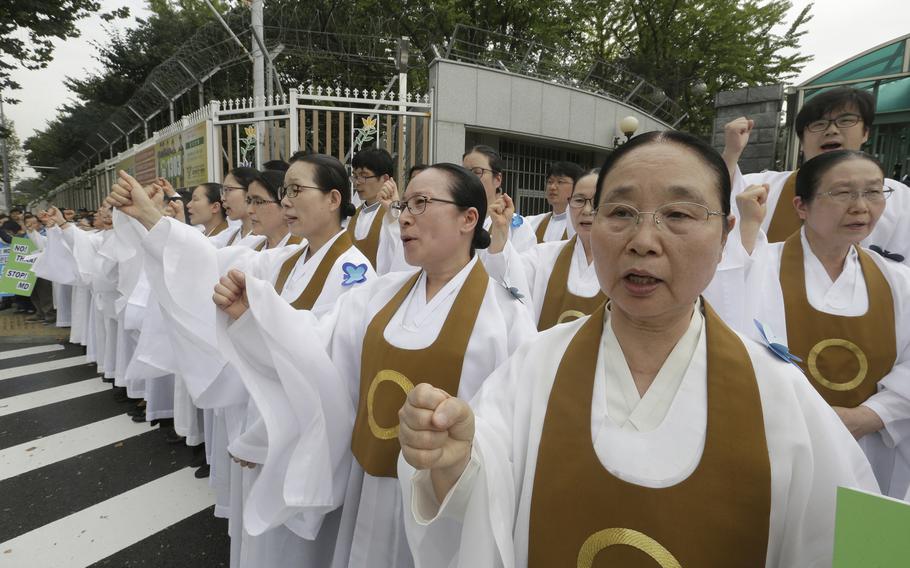
South Korean Won Buddhism monks shout slogans during a rally to oppose a deployment of the Terminal High-Altitude Area Defense, or THAAD, in front of the Defense ministry in Seoul, South Korea, Friday, Sept. 30, 2016. (Ahn Young-joon/Associated Press)
SEOUL, South Korea — The United States and South Korea will “pay the price” if they deploy an advanced U.S. anti-missile battery on the divided peninsula, China’s official media warned.
The statement was published Saturday, a day after the two allies announced the selection of an 18-hole golf course in the mountains above a southeastern farming region as the new site for the Terminal High Altitude Area Defense system.
Washington and Seoul insist the THAAD is needed solely as a defensive measure against a growing nuclear and missile threat from North Korea. Beijing fears the system’s powerful radar could jeopardize its own military.
The Reuters news agency reported that the ruling Communist Party’s official People’s Daily called the THAAD a serious threat to the region’s geopolitical balance.
“If the United States and South Korea harm the strategic security interests of countries in the region, including China, then they are destined to pay the price for this and receive a proper counterattack,” the newspaper said in a commentary.
A Chinese Foreign Ministry spokesman used less-strident terms to urge the two sides to halt the THAAD’s development. China “will take necessary measures to defend national security interests and regional strategic balance,” Geng Shuang told a news briefing Friday in Beijing.
Despite being a traditional ally of North Korea, China signed onto the most recent round of U.N. Security Council sanctions aimed at pressuring Pyongyang into giving up its nuclear program. But there are questions about its willingness to implement the measures or agree to new ones as it has clashed with the U.S. over the THAAD and the disputed South China Sea. China’s objections are among the reasons many South Koreans have criticized the decision to deploy the THAAD on the peninsula.
However, Washington and Seoul are moving forward with plans to have the THAAD in place by the end of next year, the Yonhap news agency reported Sunday.
It cited local government sources as saying the U.S. military is expected to move an operational battery with six truck-mounted launchers with eight interceptors each from Fort Bliss, Texas, to the peninsula.
U.S. Forces Korea said it could not confirm the report at this time.
South Korea’s Ministry of National Defense announced Friday that the Lotte Skyhill Country Club in the southeastern Seongju region would be the “final site” for the THAAD.
South Korea’s Ministry of National Defense announced Friday that it had selected the Lotte Skyhill Country Club in the southeastern Seongju region as the “final site” for the THAAD. The decision followed months of protests over the original plans to deploy the system at an artillery base in the same area.
The ministry said it plans to obtain the golf club from the Lotte group, one of South Korea’s biggest conglomerates, after a monthlong survey determined it would satisfy environmental, construction and health concerns.
“Therefore MND will make every effort to install the THAAD within the next year in order to better defend national security and people’s lives from the escalating North Korean nuclear and missiles threats,” it said.
The statement did not elaborate on possible terms, saying only that discussions would be held under the Status of Forces Agreement it holds with the U.S. for granted land, and design and construction.
South Korean media have reported the price tag could be more than $90 million.
The company had received a notice about the plan from the defense ministry, said club official Kim Byung-wook.
“We will positively consider THAAD’s deployment at the golf course considering the grave situation regarding national security,” he said in a telephone interview.
Washington and Seoul agreed in July to deploy THAAD to work in combination with Patriot missiles and other weapons to defend the South against North Korea’s massive arsenal.
Tensions have spiked as the communist country has conducted two nuclear tests and launched several missiles into the sea off the peninsula’s east coast this year.
But the THAAD plans have met stiff opposition from local residents with a host of concerns ranging from possibly harmful effects on health and the economy to fears of antagonizing China and becoming a target for the North.
“We’ll keep fighting for the withdrawal of THAAD deployment in the future,” said Kim Chunghwan, a protest leader in Seongju.
People in nearby Gimcheon, which borders the country club, also picketed during a visit by defense ministry officials to the area before Friday’s announcement.
The U.S. and South Korean militaries insist the radar would not pose a health threat, and the new location was selected in part to ease those concerns. It is higher and more remote that the original choice of an artillery base in the same region.
The new location also has created a new opponent — followers of the Won Buddhism religious movement who are upset because the chosen location is less than half a mile from one of their most sacred sites. Several dozen members, clad in white robes, staged a peaceful protest Friday in front of the defense ministry’s headquarters in Seoul.
North Korea, meanwhile, has tried to play into the fears held by many residents, vowing that the missile-defense system would become a primary target of its nuclear strikes.
The two Koreas remain technically at war after the 1950-53 conflict ended with an armistice instead of a peace treaty. The U.S. has about 28,500 servicemembers stationed in the South.
Stars and Stripes staffer Yoo Kyong Chang contributed to this report.
Twitter: @kimgamel